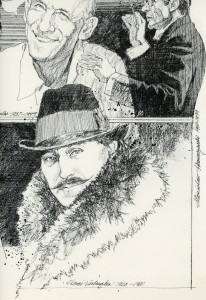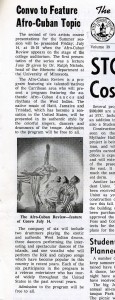#1026 – Dick Bernard: The Minnesota Orchestra goes to Cuba, and some related observations from the early 1960s
UPDATE May 14, 2015: from the Minnesota Orchestra on landing in Cuba.
Save Our Symphony has an excellent ongoing compilation of news from/about the Orchestra in Cuba.
Monday’s Minneapolis Star Tribune had as its lead story the Minnesota Orchestra’s pending visit to Cuba.
Wherever you are, you can listen to the live performances in Cuba this Friday and Saturday at 7:30 pm on Minnesota Public Radio 99.5 FM or on-line.

Henri Verbrugghen, conductor of the Minneapolis Symphony Orchestra at the time of their last visits to Cuba in 1929 and 1930. From a Symphony Ball poster ca late 1980s, courtesy of Alan Stone.
We’re regulars at the Orchestra and I’ve posted frequently on Orchestra topics, particularly during the long and very painful lockout 2012-14. The Orchestra is amazing; and the mutual intention to recover from the disastrous lockout seems amazing, for both sides.
But today seems a good time for some brief comments about another relationship, Cuba-U.S., as remembered by one who’s never been there.
As a geography major in college, I certainly knew the essentials of Cuba. The first evidence that Cuba reached out into North Dakota comes from a release which was in the July 5, 1961 Viking News (click to enlarge):

I am quite certain I went to this performance, since such events were few and far between in the town and on campus. One quickly notices that the “Afro-Cuban Review” apparently is missing the Cuban element. This is likely due to the fact that on January 1, 1959, the Cuban system of government changed, and for 56 years, now, the relationship between the U.S. and Cuba has been, officially, non-existent (with a lot of “winks and nods”, especially by business interests: where people exist, there also is a market….)
Back to early 1960s: a year or so later, out of college and in the Army, I witnessed the Cuban Missile Crisis of October, 1962, as an Army infantryman, mobilized for possible action. We were a long ways from Cuba, but nonetheless in the bullseye of the Russian missiles, and it was a scary time.
In October, 1962, we soldiers watched President Kennedy address the nation on a tiny television screen in our barracks near Colorado Springs.
Very soon, life went on. American and Russian leaders saw the implications of escalation; there was no war. But Castro’s Communist Cuba became and remained a ripe political opportunity in the U.S.; one might say, a North Korea near our shores. Fear is a useful emotion to manipulate and use….
Of course, if you happen to be the resident of the weaker enemy state, as Cubans are, you are unlikely to attempt to overthrow your government; while the stronger enemy, the U.S., in effect punishes you for the supposed sins of the leader, Castro.
Some years ago, likely at my Uncle’s farm in North Dakota, I came across a well-used college text: History of Latin America from the Beginning to the Present by Hubert Herring. This “Second Edition Revised”, 1963, includes a 21-page chapter on Cuba which drew my interest, particularly the Cuban history from 1895-1963. In this chapter on Cuba, Theodore Roosevelt was not even mentioned; nor was the then-more recent nuclear brinksmanship of the Cuban Missile Crisis era.
At the end of the chapter, the author states: “Reflecting on the sorry state of Cuba in 1960, the onlooker could say that two things are reasonably clear: Cuba was indeed overdue for a revolution, and revolutions are never mild and gentlemanly.” (p. 422)*
Thankfully, the walls constructed so well over 50 years ago between Cuba and the United States are now, finally, breaking down.
I will listen with great interest to the Minnesota Orchestra in Cuba this weekend.
A previous post with reports by two visitors to more recent Cuba can be read here.
* POSTNOTE: Here’s the entire Cuba chapter, made easy by pdf, hopefully so ancient and unavailable as to not get me in trouble with the author or publisher from over 50 years ago: Cuba to 1963001

Leave a Reply
Want to join the discussion?Feel free to contribute!